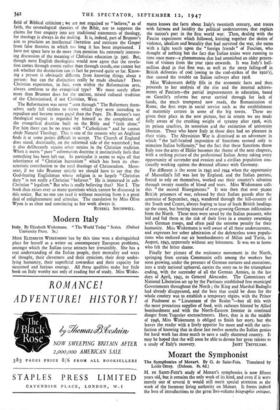Modern Italy
Italy. By Elizabeth Wiskemann. " The World Today " Series. (Oxford University Press. 5s.) MISS ELIZABETH WISKEMANN has by this time won a distinguished place for herself as a writer on contemporary European problems, amongst which the Italian scene attracts her irresistibly. She has a real understanding of the Italian people, their mentality and ways of thought, their cleverness and their cynicism, their deep under- lying humanity, their superficial cowardice and their capacity for sustained and furious courage. All these qualities make her little book on Italy worthy not only of reading but of study. Miss Wiske-
mann knows the facts about Italy's twentieth century, and traces with fairness and lucidity the political undercurrents that explain the nation's part in the first world war. Then, dealirfg with the Fascist experiment which followed, knitting together the skeins of violence, idealism and brutality that had survived the war, she turns with a light touch upon the "foreign friends" of Fascism, who thought of nothing but the fact that Italian trains were running to time once more—a phenomenon that had astonished an older genera- tion of visitors from the year 1910 onwards. It was Italy's half- million dead in that first war, as well as the steep falling-off in British deliveries of coal (owing to the coal-strikes of the 1920's), that caused the trouble on Italian railways after 1918.
Miss Wiskemann deftly fills in the economic facts and then proceeds to her analysis of the rise and the internal achieve- ments of Fascism—the partial improvements in education, based on Gentile's reforms but never carried through for lack of funds, the much trumpeted new roads, the Romanisation of Rome, the first steps in social service such as the establishment of maternity centres in some of the big towns. These are given their place in the new picture, but in return we are made fully aware of the crushing weight of tyranny after 1926, with its prison cruelties, its terrorism and the extinction of university liberties. Those who knew Italy in those days had no pleasure in their visits. The Abyssinian War is dismissed as an adventure in which " the half-hearted imposition of Sanctions seemed only to stimulate Italian bellicosity," but the fact that these Sanctions threw Italy into the arms of Hitler becomes the theme of the next chapters, with a striking picture of the professional Italian Army. taking every opportunity of surrender and evasion and a civilian population con- tinually working against the detested alliance with Germany.
Far different is the scene in 1943 and 1944 when the opportunity of Mussolini's fall was lost by England, and the Italian patriots, forced to rely on themselves, worked out their country's salvation through twenty months of blood and tears. Miss Wiskemann calls this " the second Risorgimento." It was then that over 50,00o British prisoners of war, released by their Italian guards after the armistice of September, 1943, wandered through the hill-country of the South and Centre, always hoping to hear of fresh British landings up the coast, but hearing instead of ever-growing German infiltrations from the North. These men were saved by the Italian peasants, who hid and fed them at the risk of their lives in a country swarming with German troops, and often paid the extreme penalty for their humanity. Miss Wiskemann is well aware of all these undercurrents, and expresses her sober admiration of the defenceless town popula- tions who endured our air bombardments of Milan and Turin, in August, 1943, apparently without any bitterness. It was we at home who felt the bitter shame.
Finally her picturs.: of the resistance movement in the North, springing from certain Communist cells among the workers but soon growing, under the pressure of German tortures and executions, into a truly national upheaval, carries the story on to the triumphant ending, with the surrender of all the German Armies, in the last days of April, 1945, to General Alexander. The Committees of National Liberation set up by the Partisans established free municipal Governments throughout the North ; the King and Marshal Badoglio had already disappeared, and the best that could be done for the whole country was to establish a temporary regime with the Prince of Piedmont as " Lieutenant of the Realm "—but all this with the most precarious supplies of food, with railways blasted by Allied bombardment and with the North-Eastern frontier in continual danger from Yugoslav encroachments. Here, that is in the middle of 1946, Miss Wiskemann is obliged to finish her story, but she leaves the reader with a lively appetite for more and with the satis- faction of knowing that in these last twelve months the Italian genius for hard work has done much to save a sadly shattered country. It may be hoped that the will soon be able to devote her great talents to


































 Previous page
Previous page